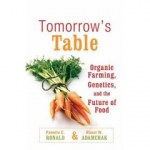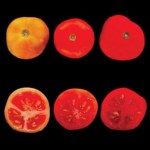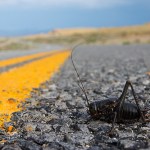agriculture
Bill Gates had a lot of thoughtful things to say about technology and social innovation at the recent Techonomy conference, including a nice plug for Tomorrow's Table!
"There's a lot of great thinking [from both the GMO and organic communities], which lead to things you should care about-preserving the environments and feeding people with a decent diet."
Video:
Reinventing Capitalism: How to jumpstart what the marketplace can't
Speaker: Bill Gates, Bill & Melinda Gates Foundation Interviewed by Brent Schlender
http://link.brightcove.com/services/player/bcpid87735931001?bclid=87675…
The…
When you look over the assortment of sizes, shapes and colors of tomatoes displayed in the market, do you stop to consider the time and effort that went into developing them (more than ten years to create a new commercial cultivar)? But a variety of sweet, pink-skinned tomato that's popular in the Far East could speed-up the breeding of new cultivars in this region. In the search for the mutation that gives these tomatoes their pink hue, Weizmann scientists discovered a "master" gene that regulates the levels of hundreds of tomato metabolites. That gene, say the scientists, might be used as a…
Wendell Berry has an essay in which he argues that the greatest single evidence for the merits of British culture is that they developed sixty-five breeds of sheep:
What does it mean that an island not much bigger than Kansas or more than twice the size of Kentucky should have developed sixty or so breeds of sheep? It means that many thousands of farmers were paying the most discriminating attention, not only to their sheep, but also to the nature of their local landscapes and economies, for a long time. They were responding intelligently to the requirement of local adaptation. The result…
Hat tip to reader Abbie who pointed me to this video. When we talk about local and organic, one of the central things that often gets lost is this - who does the work? And how are they paid? And how do you change this so that they get paid fairly - because right now the way we pay for food leaves a lot of folks out.
Dateline NBC introduces you to your five year old tomato picker
Sharon.
Climate change is the ultimate threat multiplier that will make other problems such as agricultural productivity worse.
This is one of the conclusions at a panel called "Trusting Climate Science" here at the
Aspen Environment Forum, sponsored by the National Geographic and the Aspen Institute.
I am experimenting with liveblogging from the meeting. Lets see how it goes.
The first panel I attended featured Andrew Revkin, Peter Huybers, Mohan Munasinghe, moderated by David Brancaccio.
"The pace of sea level rise is uncertain" says Revkin. It is a distraction to argue about the pace when we…
The first thing you need to know about my farm is that it is huge. I mean enormous - by world standards. The vast majority of the world's farms - more than 80%, are very small farms, of less than 2 hectares (about 5 acres), and they produce the majority of the world's staple crops and calories.
I suspect most folks in most of the Global North will find that a little surprising. The term "farm" in the US tends be applied most often to very large farms. We have a strong internal sense that small scale agriculture is particularly unsuited to growing staples. Most small farms in the US…
How do you help people who live on less than a dollar a day?
This is one of the challenges that the Bill and Melinda Gates Foundation is taking on. In preparation for a recent visit there, Raoul and I reread a speech that Bill Gates gave at the 2009 world food prize symposium
It is worth a read.
He points out that three-quarters of the world's poorest people get their food and income by farming small plots of land. So if we can make small-holder farming more productive and more profitable, we can have a massive impact on hunger and nutrition and poverty.
If we are successful, we can also…
Longtime readers of ye olde blogge will remember that we talked a lot about wheat stem rust and other wheat diseases in the last few years, since Ug99 began to devastate Kenyan wheat production, and then again as it appeared in Yemen and Iran, but I don't think I've posted anything about the track of wheat stem rust since I moved over to Science Blogs. But the Economist has a good introductory article on the issue this month that is worth reading for those of you who haven't been following this.
The new variant is called Ug99: Ug for its country of origin; 99 for the year it was confirmed.…
Garden Calendar
When the dogstar is aglow
plant petunias in the snow.
When the snow begins to melt
Wrap your hollyhocks in felt.
When the felt begins to bloom
pick the apples off your broom.
When the broom begins to wear
weed the turnips in your chair.
When the chair begins to rock
prune the snowdrops in your sock.
When the sock is full of holes
blame the whole things on moles.
When the moles inquire: "Why
pick on us?" say simply "I
will instruct you how to grow
pink petunias in the snow. - NM Bodecker
Note: Today is the first day of my month-long fall gardening class, which will help more…
We come across this very depressing article about how Detroit is becoming 'unsettled', in that it is suffering from a massive population decrease, leading to some unprecedented solutions:
But a new momentum has taken hold here that embraces just that: shrinking the city in order to save it.
"There's nothing you can do with a lot of the buildings now but do away with them," said Mae Reeder, a homeowner of 35 years on the southeast side, where her bungalow is surrounded by blocks that are being reclaimed by nature, complete with pheasants nesting in vacant spaces where people once lived.
The…
"No Till" is a confusing term. For most people who know nothing about agriculture, the word "till" isn't particularly revealing - it sounds like there's no cash register. Given that level of knowledge, when you are reassured that no tillage means less erosion, you aren't going to crticize. Those with home gardens often know something about a different kind of "no till" than "no till agriculture" - they may envision gardens with permanent mulch in formal beds, and assume that field-scale no-till looks something like that.
I'm pleased that Gene Logsdon then points out what I've also…
A newly produced UN Report rightly points out, among other things, that the western model of meat and dairy production simply won't work on a planet of 9 billion people. The report, which quantifies the basic unsustainability of affluent societies and the challenges facing us in satisfying needs we've spent a century creating and can't possibly actually fulfill, is generally a good one. But I do want to take issue with the underlying assumptions in the report, including the ones that lead the UN to the most controversial and media-attention gathering claim - that we need to move towards a…
The Economist recently published a special report on water, which summarizes the difficulty of ensuring adequate clean water supplies for a growing global population. (It also touches on the related challenge of sanitation, which affects water quality.) Agriculture accounts for nearly 70% of the world's water use, although that number varies by region. In the US, 41% of water goes to agriculture; in India, the number is close to 90%.
India also has the distinction of being the country that draws the most groundwater, the Economist reports. With most areas subsidizing electricity, it's…
With plumes of crude oil destroying the Gulf of Mexico, tensions rising in the middle east, a severe hurricane season reving up in the Atlantic, and the earth opening up and just plain swallowing parts of Guatemala City whole, what else could possibly go wrong?
A mormon cricket crosses the road, Nevada.
Well. How about a plague of locusts?*
The USDA has just announced that the conditions are ripe for a grasshopper outbreak in the northern great plains:
The U.S. Department of Agriculture's Animal and Plant Health Inspection Service (APHIS) is expecting potentially heavy grasshopper outbreaks…
I plant weeds sometimes. I just feel I should admit this upfront, and come out with it and accept your outrage. You see, my property isn't exactly untouched - it was a sod farm at one point (although most of the actual sod harvesting was done across the road on a field that is not mine), which means that for about decade from the mid-70s to the mid-80s, people poured incredibly toxic chemicals on the ground to keep the grass uniform and then dug up the topsoil and sold it rich people who couldn't wait long enough for grass to grow.
Before that it was a dairy farm, cleared as far as the eye…
Let me tell you a little story. When I was born my parents had two cats. One was named Garfield. The other...well, I don't remember what the other one was called. Not long after I was born, and little Jason was coughing up furballs, the doctors informed the parents that their little bundle of skin and hair was allergic to cats. It was then that teams were picked and lines were drawn. It was me or the cats. Luckily, the parents decided to keep me, and lose the cats. Imagine how much it would have sucked if they decided to keep the cats and lose me. I imagine if my younger brother had actually…
From the wonderful Agricultural Biodiversity Weblog (a favorite of mine) over at Research Blogging, is a fascinating summary of paper that describes the ways that most modern seed varieties, selected to be used under commercial conditions, don't do as well under organic conditions, because we haven't selected for the qualities that would enable success:
To perform well under organic conditions, varieties need to get a fast start, to outcompete weeds, and they need to be good at getting nitrogen from the soil early on in their growth. Organic farmers tend to use older varieties, in part…
Note: This is a repeat from ye olde blogge, brought about by the barn cleaning we're engaged in.
From December to March or the beginning of April, we simply don't clean out the barn. This sounds as if it might be gross, but it really isn't - we keep layering on bedding, and sufficient carbon keeps it from smelling bad - earthy and barnish, sure, but not particularly icky. We don't just do this because we're lazy - this is good husbandry for our climate. The barn has cement floors, left over from its days as a garage, and those cement floors get cold in the winter. A very thick layer of…
Last Sunday's New York Times had an article about the shortage of slaughterhouses for those raising non-industrial and local meat.
According to the United States Department of Agriculture, the number of slaughterhouses nationwide declined to 809 in 2008 from 1,211 in 1992, while the number of small farmers has increased by 108,000 in the past five years.
Fewer slaughterhouses to process local meat means less of it in butcher shops, grocery stores and restaurants. Chefs throughout the Northeast are partnering with farms to add locally-raised meat to their menus, satisfying a customer demand.…
tags: fish farming, aquaculture, piscivory, bird sanctuary, foodie, ethical eating, permaculture, agriculture, poverty, hunger, Dan Barber, TEDTalks, streaming video
Chef Dan Barber squares off with a dilemma facing many chefs today: how to keep fish on the menu. With impeccable research and deadpan humor, he chronicles his pursuit of a sustainable fish he could love, and the foodie's honeymoon he's enjoyed since discovering an outrageously delicious fish raised using a revolutionary farming method in Spain. My one complaint about this video is that the speaker never once identifies either of…




